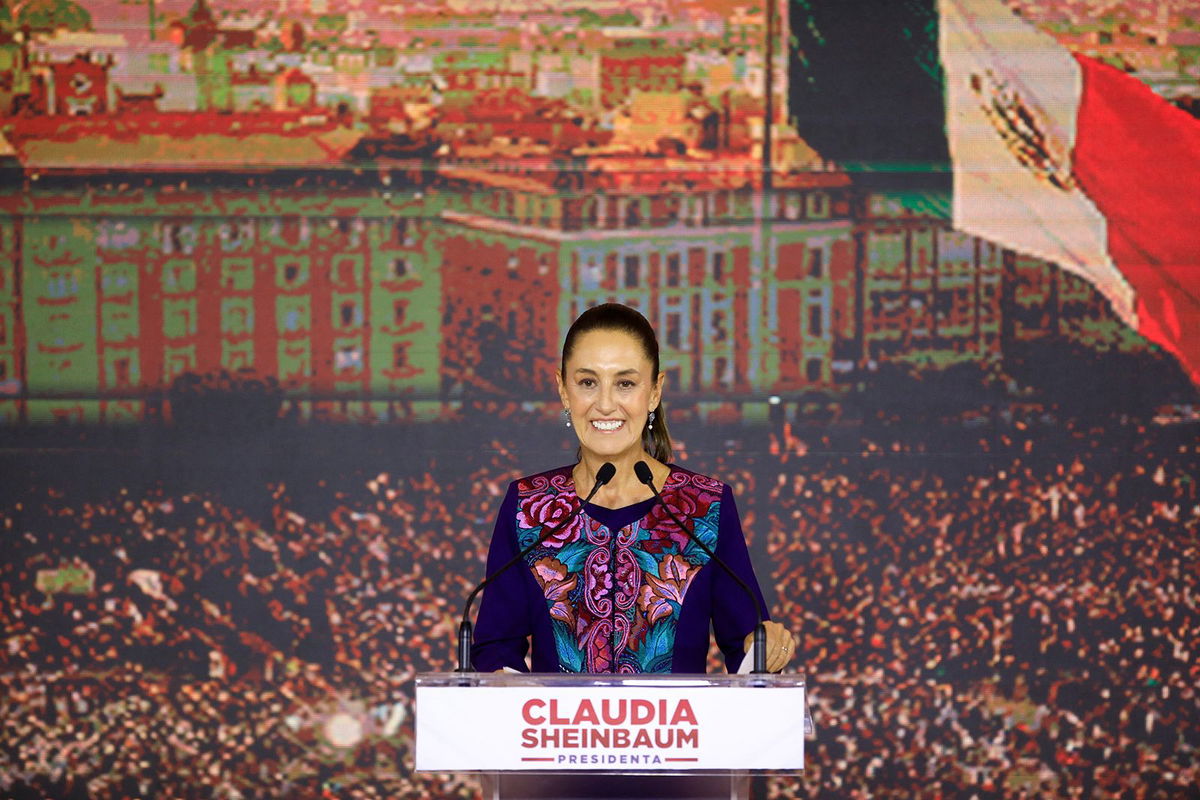Claudia Sheinbaum elected Mexico’s first female president, preliminary results show

Originally Published: 03 JUN 24 02:04 ET
Updated: 03 JUN 24 09:53 ET
By Tara John and CNN en Español
(CNN) — Mexico has elected its first female president, with preliminary results showing Claudia Sheinbaum, a climate scientist and Mexico City’s former mayor, is on track to win the country’s largest election in history.
Sheinbaum has won between 58.3% and 60.7% of the vote, according to what is known as Quick Count, an exercise that the National Electoral Institute (INE) carries out based on a statistical sample of ballots from polling stations.
The 61-year-old rode the wave of popularity of her longtime political ally, the outgoing leftist Mexican President Andrés Manuel López Obrador, and their Morena party.
Sheinbaum is not only set to be Mexico’s first female president, but also the country’s first Jewish leader, although she rarely speaks publicly about her personal background and has governed as a secular leftist.
Sheinbaum said her administration would govern all Mexicans “without distinction.”
“Even though many Mexicans do not fully agree with our project, we will have to walk in peace and harmony to continue building a fair and more prosperous Mexico,” she told crowds of supporters that filled the main square in Mexico City, the Zócalo, in the early hours of Monday.
She spoke about the historical significance of becoming the first female president of the country.
“I am also grateful because, for the first time in 200 years of the republic, I will become the first woman president of Mexico,” she said.
Trailing Sheinbaum is opposition candidate Xóchitl Gálvez, backed by a coalition of the National Action (PAN), Institutional Revolutionary (PRI) and Democratic Revolution (PRD) parties, with between 26.6% and 28.6% of the votes.
In third place is the Citizens’ Movement candidate, Jorge Álvarez Máynez, with between 9.9% and 10.8% of the votes.
According to the quick count results, participation in the presidential election was between 58.9% and 61.7% of the electorate of nearly 100 million people.
Obrador, the outgoing president and Sheinbaum’s political mentor, congratulated Sheinbaum on her win.
“With all my affection and respect I congratulate Claudia Sheinbaum who came out victorious with an ample margin. She will be the first (female) President of Mexico… but also the President, possibly, with most votes obtained in all of the history of our country,” he said in a video posted on X.
Sheinbaum’s projected win is a remarkable moment for a country that is a world leader when it comes to gender equality in elected office, a position it cemented in 2019 with constitutional reform. It outflanks several countries in terms of women’s parliamentary representation.
Yet Mexico remains a dangerous place to be a woman: it has sky-high femicide rates with around 10 women murdered in Mexico every day.
Sheinbaum ran Mexico’s most important city for five years until her resignation last June to run for the presidency. She is also the co-author of a Nobel-winning Intergovernmental Panel on Climate Change report and is married to Jesús María Tarriba Unger.
She is seen as a continuation of the status quo left by López Obrador, whose social welfare programs boosted the Morena party’s popularity and had a positive impact on the lives of poorer Mexicans. Under the Mexican constitution, presidents can only be elected to one term and cannot run again.
Sheinbaum has pledged to continue her predecessor’s policies, including a pension for all senior citizens, scholarships for more than 12 million students and free fertilizers for small farm owners, but has rejected criticism of her close political alignment with López Obrador.
She is set to be replaced as the mayor of Mexico City by another women, Clara Marina Brugada Molina from Scheinbaum’s Morena party. She secured between 49% and 52.8% of the votes, according to the Quick Count, while the opposition Santiago Taboada got 37.2% to 40.5% of the votes.
Largest election
Sunday’s poll was the largest election in the country’s history. More than 98 million voters were registered to cast a ballot, and 1.4 million Mexicans were eligible to vote abroad.
In addition to the presidency, more than 20,000 positions were being contested by an estimated 70,000 candidates vying to become senators, mayors and governors.
But the elections were plagued by immense violence. There have been more than 20 political killings since September, according to the Mexican government. By some estimates though, that number is even higher. According to Mexican consultancy firm Integralia, at least 34 candidates were murdered in the run-up to the vote.
Voting was suspended for several hours on Sunday in the southeastern Mexican town of Coyomeapan due to violence at the polling centers, according to state electoral authorities.
And while the murder rate fell in Mexico between 2019 and 2022, in absolute numbers the country is still reeling from historically high levels of around 30,000 homicides each year. The true number is likely higher, experts say.
The violence appeared to have been a top concern for voters as cartels extend their grip through Mexico.
Sheinbaum has been coy about her security proposals but has pointed to her record as Mexico City mayor, when, according to her team, she improved the police force’s working conditions and intelligence-gathering abilities.
One big challenge for her will be convincing voters that she can end the culture of impunity in Mexico, where around 95% of all crimes nationwide went unsolved in 2022, according to think tank Mexico Evalua.
After the final results come in, the Electoral Tribunal of the Judicial Branch of the Federation (TEPJF) must receive and analyze any possible challenges to the process, as well as qualify the presidential election no later than September 6. If the court validates the election, Sheinbaum will take office on October 1. Her term will last six years, from 2024 to 2030.
This story has been updated.
The-CNN-Wire
™ & © 2024 Cable News Network, Inc., a Warner Bros. Discovery Company. All rights reserved.